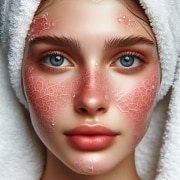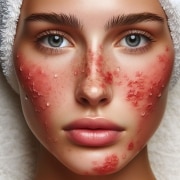What changes can I expect in my skin with menopause and thyroid disease?
As I navigate through the changes brought on by menopause and a thyroid disease, I have noticed significant alterations in my skin. When it comes to menopause, I have experienced dryness, thinning, and sagging of the skin, leading to an overall loss of elasticity. On the other hand, my thyroid disease has caused dry, itchy, and flaky skin, as well as hair loss in certain areas. However, it’s not all negative – I have also noticed that my skin has become more sensitive and easily irritated, so it’s crucial for me to pay extra attention to my skincare routine.
Table of Contents
Key Takeaways:
- Decrease in estrogen: Menopause causes a decrease in estrogen levels which can lead to thinning of the skin, dryness, and reduced elasticity.
- Hormonal imbalance: Thyroid disease can disrupt the balance of hormones in the body, leading to changes in skin texture, hair loss, and brittle nails.
- Increased risk of skin conditions: Both menopause and thyroid disease can increase the risk of developing skin conditions such as acne, eczema, and dry skin.
The Effects of Menopause on Skin
Some of the most significant changes in my skin due to menopause have been the result of hormonal fluctuations. As I entered menopause, the decrease in estrogen levels led to a reduction in collagen and elastin production, which are essential for maintaining skin elasticity and firmness.
Hormonal Changes and Skin Elasticity
During menopause, the decline in estrogen levels can impact the skin’s elasticity. This can lead to loss of firmness and sagging in various areas of the body, including the face, neck, and hands. The reduction in the production of collagen and elastin contributes to the formation of wrinkles and fine lines, making the skin appear less smooth and youthful. Incorporating a regular skincare routine that promotes collagen production and elasticity can help address these concerns.
Dryness and Menopausal Skin
Another common issue I have experienced with menopausal skin is dryness. The decrease in estrogen levels can lead to a decrease in oil production, resulting in a drier complexion. This dryness can cause the skin to feel tight, itchy, and more prone to irritation. Using hydrating and nourishing skincare products, as well as incorporating omega-3 fatty acids into my diet, has helped mitigate the effects of dryness on my skin.
Thyroid Disease and Skin Manifestations
Assuming you have been diagnosed with thyroid disease, it’s important to understand that this condition can have a significant impact on the health and appearance of your skin. The thyroid gland plays a vital role in regulating the body’s metabolism, and when it is not functioning properly, it can lead to a range of skin manifestations.
Hypothyroidism and Hyperthyroidism: A Comparison
When it comes to thyroid disease, there are two main conditions that can affect the skin: hypothyroidism and hyperthyroidism. In hypothyroidism, the thyroid gland is underactive and does not produce enough hormones, leading to a slowdown in the body’s metabolic processes. This can result in dry, rough, and pale skin, as well as brittle nails and hair loss. On the other hand, hyperthyroidism is characterized by an overactive thyroid gland, which can cause excessive sweating, warm and moist skin, and thinning hair.
| Hypothyroidism | Hyperthyroidism |
| Dry, rough, pale skin | Excessive sweating, warm and moist skin |
| Brittle nails | Thinning hair |
Common Skin Conditions Associated with Thyroid Disease
In addition to the specific skin changes associated with hypothyroidism and hyperthyroidism, there are also several common skin conditions that may be more prevalent in individuals with thyroid disease. These can include acne, eczema, and vitiligo. Acne is a common skin condition characterized by inflamed or infected sebaceous glands in the skin, and it can be exacerbated by hormonal imbalances associated with thyroid disease. Eczema, a condition that causes the skin to become inflamed, itchy, and red, may also be more prevalent in individuals with thyroid disease. Lastly, vitiligo, a condition that causes loss of skin color in patches, has been linked to autoimmune thyroid disease, particularly in individuals with hypothyroidism.
Managing Skin Health During Menopause and Thyroid Disease
However, managing skin health during menopause and thyroid disease is crucial to minimize the impact of hormonal changes on your skin. Whether it’s dryness, thinning, or acne, taking proactive steps can help you maintain healthy and glowing skin.
Lifestyle Modifications
Adopting a healthy lifestyle is key to managing skin health during menopause and thyroid disease. Eating a balanced diet rich in antioxidants, omega-3 fatty acids, and vitamins can support skin health. Additionally, staying hydrated and limiting alcohol and caffeine intake can help maintain skin moisture and elasticity. Regular exercise can also improve blood circulation and promote skin health.
Medical Treatments and Skin Care
Seeking medical treatment and establishing a proper skin care routine can also make a significant difference. Consulting with a dermatologist or endocrinologist can help address specific skin concerns related to menopause and thyroid disease. They can recommend topical treatments, prescription medications, or hormone replacement therapy to manage skin issues. Furthermore, using gentle cleansers, moisturizers, and sunscreen tailored to your skin type can help maintain skin health and protect against environmental damage.
To wrap up
I have learned that with menopause and thyroid disease, I can expect changes in my skin such as dryness, thinning, and a decrease in elasticity. These changes are due to hormonal imbalances and a decrease in collagen production. To manage these changes, it is important to maintain a healthy skincare routine, stay hydrated, and consult with a healthcare professional for hormone replacement or thyroid medication. By staying proactive and informed, I can effectively address and manage the changes in my skin during menopause and thyroid disease.
















Leave a Reply
Want to join the discussion?Feel free to contribute!